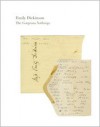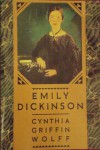Currently reading
Saints in Art
The Gorgeous Nothings: Emily Dickinson's Envelope Poems
Selected Poems
Emily Dickinson
Lies My Teacher Told Me : Everything Your American History Textbook Got Wrong
Gone with the Wind
Murder at Mansfield Park: A Novel
 The good news is, if you’re one of the people who've made a principled decision never to read a word written by Lynn Shepherd, you’re not missing a thing. Promise. Word of honor.
The good news is, if you’re one of the people who've made a principled decision never to read a word written by Lynn Shepherd, you’re not missing a thing. Promise. Word of honor.The reason you might have sworn off all things Shepherd is that she’s the woman who wrote that Huff Post column about how J.K. Rowling should stop writing and give other authors a chance. Her premise is that any book written by Rowling will routinely go bestseller, so readers will flock to her newest offering. If Rowling doesn’t write anything, people will be forced to look at other bookstore shelves for something amusing to read, and they’ll have the chance to see other writers they might otherwise have never heard of.
There’s one thing wrong with this piece of logic. (Other than the jerk-head factor of telling a talented writer to please shut up.) The flaw in Shepherd’s argument is that there are plenty of people who were non-readers who were drawn to books by Rowling. These are people who learned through reading Harry Potter that we book-lovers weren’t being pretentious showoffs when we carried a book with us every minute of every day. These people developed the habit of reading fiction thanks to Rowling. I know this, because I know some of these people.
There are also, sadly, plenty of people who read all the Harry Potter books and aren’t interested in reading anything else. If Rowling goes away, these people aren’t going to restlessly browse for other titles. They’re going to go back to whatever it is they do when they aren’t reading Harry Potter. I know some of these people, too.
This isn’t the part of Shepherd’s article that got people screaming, though. What really burned the collective biscuit of the reading community was Shepherd’s airy admission that she hasn’t actually read the Harry Potter books, but she thinks it’s a shame that so many adults have. They may be good – she wouldn’t know – but surely grownups would be better served with more intellectually stimulating works than (sniff) children’s books.
Shepherd may be laboring under the delusion that it’s true, as they say in Hollywood, that there’s no such thing as bad publicity. And it’s a fact that her deliberately provocative article brought her name to the attention of plenty of people who had never heard of her.
The problem is that their reaction was to solemnly swear that they would never, ever, under any circumstances read her books. If she thinks these people are either kidding or exaggerating, she should check the number of people who put her lone published title on a shelf marked “will never read.” She should also see how many people put her book on their “I’ll really have to check this out some time” list.
So far as I know, I was the only one who responded in that fashion. And even I knew enough to keep it to myself. I figured I’d sneak over to the library (it’s not as if she gets paid extra for the copy they already bought if I check it out), burn through her book in a day or two, and give her what she refused to give Rowling: a fair hearing.
Her book is an Austen sequel. I’m an Austen reader. How hard could it be?
Sorry, what did you just say? I couldn’t hear you over all those FAMOUS LAST WORDS.
It’s not just that this book sucks so hard I sustained permanent mental hickeys. It’s that the premise itself is so inexcusable it crosses the line into offensive.
The book is called Murder at Mansfield Park. Mansfield Park is one of Austen’s least-read, least-loved books.
I used to spend a lot of time on an Austen forum. Periodically, “Fanny wars” would break out, and we’d all be forced to choose sides.
It was brutal. Families were divided. Friendships were destroyed. Lives were ruined.
Okay, that last bit is an exaggeration. But the other ones are really, truly, true.
Fanny wars, to Janeites, are passionate battles over whether Fanny Price (the heroine of Mansfield Park) is sweet and lovable and all things good, or if she should be incarnated in the flesh by some latter-day Dr. Frankenstein so we can all have a good time slapping her.
I can see both sides. The first time I read Mansfield Park, I adored poor Fanny. The second time, I stopped loving freedom long enough to believe we ought to have laws against anyone being that annoying. Eventually, after many more readings, I shifted into a quiet, reasonable admiration for her, seasoned with an occasional sigh and a sometimes audible wish that she would for God’s sake cheer up, already.
Lynn Shepherd is one of the haters. Her book is, according to the back cover copy, “an irreverent new twist” on Mansfield Park.
I guess that’s one name for it.
Imagine overhearing the following conversation:
“Guess what? I’m writing one of those Jane Austen sequels! It’s going to be called Pride and Prejudice and Hotties!”
“That sounds fun. But don’t you think the title’s a little too close to Pride and Prejudice and Zombies?”
“What? No! Okay, so here’s what it’s going to be. There are two sisters, Elizabeth and Jane Bennet. Elizabeth’s the oldest. Jane’s the youngest.”
“Um, it’s actually the other way around.”
“In the original, yeah! But this is a rewrite! Obviously I have to make it different, right?”
“Well, sure. But most people do that by taking a new angle on the story. Maybe they write it from the point of view of the maid. Or they tell a story set in Pride and Predjudice’s future – like how the Darcys are getting along after their marriage or something.”
“Well, that’s not what I’m doing. I’m doing a whole new story!”
“But you’re calling it Pride and Prejudice.”
“Exactly! So there are two Bennet sisters, Elizabeth and Jane.”
“Wait. Just two? There are five in the original story.”
“Have you been listening? If I keep it just like in the original story, what’s the point?”
“Uh...”
“So. Elizabeth is the oldest. She’s kind of ugly and boring. Nobody likes her much. They just feel sorry for her. And Jane is this really flighty airhead. She’s not very pretty, either. She’s just boy-crazy.”
“But – how is this Pride and Prejudice?”
“Keep listening. So this hot guy shows up in town.”
“Mr. Wickham?”
“No, no. Mr. Collins.”
“Mr. Collins is HOT???”
“Totally! And both the Bennet sisters totally fall for him, but he gets this mad crush on Charlotte Lucas. ‘Cause she’s hot, too. And worldly and sophisticated. And rich.”
“Okay, HANG on.”
“But the Bennet sisters don’t feel too bad. Their dad has a lot of money, and he tells them if they don’t get married, they can have their dowries in cash instead and open up a business in London. I cut out that boring thing about how the Bennets need to have a son or their estate gets left to somebody else.”
(Sound of head exploding.)
What I just described does less violence to the story of Pride and Prejudice than Shepherd does to Mansfield Park. It would also undoubtedly be less painful to read.
Shepherd changes Fanny Price from the saintly, impoverished eldest sister of a large family to a spoiled-rotten only-child heiress. She makes Fanny’s rival in love, the arch-sophisticate Mary Crawford, into a sweet and impoverished young woman.
Here’s my question.
WHY?
What does it even MEAN to “rewrite” a story so much that the WHOLE ENTIRE POINT is lost?
In the real Mansfield Park, Fanny Price is an adopted child who starts off pitied and pushed about and ends up being the redeemer and moral compass of her little corner of the world. She’s seen as timid to a fault, but triumphs over the corruption around her with a moral strength and fortitude that even her enemies have to admire.
In the real Mansfield Park, Fanny’s mother defiantly runs off with a lowly man and had, like, a million kids with him. In this “telling,” Fanny Price is the child of a reasonably genteel woman and a really really rich man. The only child.
Is there a philosopher in the house? Doesn’t that make her not Fanny Price any more?
When I realized this book was utterly unreadable, I thought I had to bow out of reviewing it. Then I remembered something about the 25 pages I’d managed to get through.
Easily half the prose is lifted directly from Austen herself. It would be as if a P&P “sequel” started off with the famous line about a truth universally acknowledged, and then went on to quote the next line from P&P, and the next, and the next. So really, I've already read at least half of Shepherd's book. Which is more than she did for Rowling.
I promise you: if you see something you like in here, it’s a quote from Austen.
Did Shepherd think nobody would notice she was doing this? Or did she figure no one would care? It’s only Mansfield Park, after all.
I take it back. Not all of the writing in here is stolen from Austen. Some of it is stolen from Elizabeth Inchbald, the author of the play the characters from the real Mansfield Park decide to perform for fun. Shepherd keeps that part of the plot, probably in order to make it even easier for her to finish her self-allotted daily word-count goals while she was working on Murder at Mansfield Park. She could have been aiming for five thousand words a day and still have finished in under an hour.
I really did want to try to finish this, since the back cover mentions something about “a thief-taker from London” who comes to Mansfield Park in order to solve the titular murder. That might have been interesting. I could have learned something.
I tried. I failed. I’ll Google “thief-takers.”
And now I’m going to get a stiff drink and a good book and try to wash away the taste of this irredeemable piece of trash.








